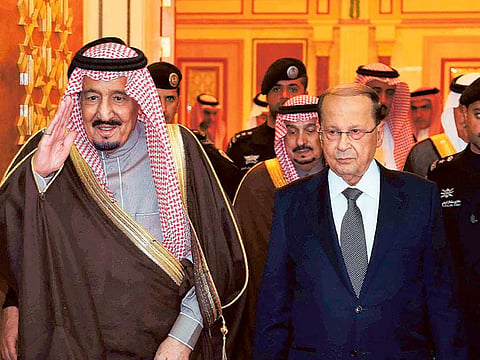Aoun meets Salman in fence-mending visit
It is the Lebanese President’s first trip abroad since taking office

Dubai: Lebanon’s newly elected President met on Tuesday with the Saudi King during his first visit to the kingdom, a meeting that could melt the ice between the two countries after relations became strained over divisions on Iran and Lebanese Hezbollah militants.
The kingdoms state news agency SPA said that Michel Aoun, 83, who arrived on Monday along with eight ministers, was first received by Riyadh Governor, Prince Faisal Bin Bandar Al Saud.
On Tuesday, Aoun met with King Salman at the Yamama palace in Riyadh where he received a red-carpet reception, SPA said.
On the second day of his visit, King Salman and Aoun discussed bilateral relations, SPA said but didn’t elaborate.
Aoun headed a high-ranking delegation of eight ministers — defence, finance, interior, foreign affairs, education, economy, information and the state minister for presidency affairs.
It is Aoun’s first trip abroad since assuming the presidency.
Among various concerns that preoccupy Lebanon, three specific issues top the agenda, including vital economic ties, the kingdom’s rescinded pledge to donate $3 billion (Dh11 billion) to purchase French weapons for the Lebanese Armed Forces (LAF), and regional tensions that encompass the wars in Syria and Iraq.
On Saturday, the chairman of the Federation of the Chambers of Commerce, Industry and Agriculture in Lebanon, Mohammad Choucair, told Al Sharq Al Awsat that Aoun’s visit to Saudi Arabia will restore ties back to normal.
Choucair added: “The former Lebanese government has made mistakes against the kingdom,” insisting that Lebanon cannot survive economically without the GCC states.
Choucair emphasised that remittances by Lebanese nationals from Saudi Arabia constituted as much as half of Lebanon’s annual financial inflows.
There are an estimated 500,000 Lebanese employed in Saudi Arabia (with an additional 250,000 in other GCC member states) who transferred between $7 billion and $8 billion back home each year.
Aoun, who once served as commander of the Lebanese army, is also expected to request advanced weapons from Riyadh.
It was unclear whether Saudi officials will reinstate the huge military grant, which was suspended after Jibran Bassil, the Minister of Foreign Affairs who heads the Hezbollah-allied Free Patriotic Movement, voted against the unanimous League of Arab States (LAS) and Organisation of Islamic Cooperation (OIC) resolutions that condemned the January 5, 2016 Iranian attacks on Saudi missions in Iran.
Aoun was expected to raise the issue of free movement for Saudi and Lebanese citizens between the two countries, in an implicit reference to a Saudi ban on Lebanese Shiites.
A former general, Aoun was elected in October after a 29-month impasse over the country’s top post.
Lebanon’s political factions are deeply divided with some, like Aoun’s Christian party, the Free Patriotic Movement, and the Hezbollah militant group, aligning with Iran, and their opponents siding with Saudi Arabia.
Last February, Saudi halted a $3-billion arms deal with Lebanon, a decision linked to the kingdom’s tensions with Iran.
In December, the 128-member Lebanese parliament approved a new national unity government headed by Lebanon’s top Saudi ally, Sa’ad Hariri. He endorsed Aoun, ending the longstanding deadlock between the two old-time foes.
Hariri is a longtime critic of Hezbollah’s support for the Syrian government in that country’s ongoing civil war.
The militant group has sent thousands of its members to fight alongside Syrian President Bashar Al Assad’s forces.
Aoun’s trip will also take him to Qatar and Iran.
Sign up for the Daily Briefing
Get the latest news and updates straight to your inbox


